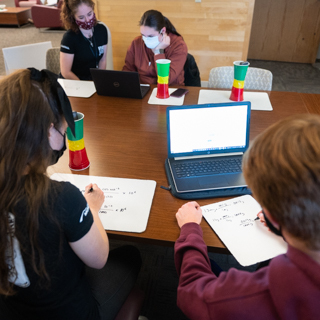For Students
When to use Tutoring
Use tutoring early and often as UM's Writing and Public Speaking Center recommends. Establishing tutoring as part of your routine at the start of the semester helps you grasp foundational concepts that the class will continue to build upon. Even if coming in for just a quick 30 minutes of questions per week can make a huge difference in final grades. Start using tutoring before you have any trouble in the class. Concept mastery takes work; tutoring helps reinforce lessons.
Getting the most out of Tutoring
Prepared or Unprepared?
Tutors are comfortable working with you if you are overly prepared or if you have no idea what you need to do to prepare for a tutoring session. As you integrate tutoring into your routine, you will find what works best for you. Below are some tips to put yourself in a tutoring mindset and some suggestions for how you might make sure you get the most out of tutoring sessions.
Ways to Use Tutoring
Some students come straight from lecture to tutoring sessions to start assignments. Attempting the homework independently while at tutoring ensures you have a tutor nearby that you can call in when you get stuck.
Other students attempt the homework outside of tutoring and then come in with specific questions. Coming in with questions allows you to focus tutoring time on the areas you have self-identified.
Both strategies are great ways to utilize group tutoring. It is important for students to determine what approach works best for them.
Bring your class materials.
Notes, books, laptops for online homework, handouts, assignments, calculators, periodic tables... Having your resources with you helps you familiarize yourself with them and helps the tutor reference specific examples. Tutoring centers often have some resource material, but having your own is best case scenario.
Have a question or two.
Take some time to identify where you are struggling with the course content. Maybe it's a certain type of problem or some foundational information you missed in a lecture or determining when to apply specific concepts. Your questions clue the tutor in on how best to help you and makes sure you know where to focus your energy during tutoring sessions.
Try to fly on your own.
Regardless of how you utilize tutoring sessions, pay attention to where you get hung up. Call the tutor over as you identify these pain points for some direct feedback. It is important to develop a process for evaluating your work in the moment which helps tremendously when it comes to tests and using foundational knowledge in future classes.
Have Realistic Expectations.
Expect to struggle and make mistakes. Learning is not easy and, at times, uncomfortable. Expect the tutor to offer strategies to you and to the other students in the group. Know that there will most likely be others at the tutoring sessions and that you probably won't receive undivided attention from the tutors. That doesn't mean they don't care and that they aren't capable of awesome assistance. Use wait time to answer the problems you do know or review your notes, or to try some other approaches to the problem. This type of learning comes in handy during the test.
Tutoring is Supplemental and not an Alternative.
Tutoring is designed to enhance and support learning that is already taking place. Tutoring is best used early and in tandem with lectures, readings, and homework. It cannot fill the void of missing classes or choosing not to do the readings or practice problems. Depending on tutors to teach course content is an unrealistic expectation and one that leads to much frustration.
Take a Break.
Know your limitations and take a break during the sessions if you start to feel overwhelmed or if you find yourself zoning out. Even a quick trip down to the Corner Store can revive a tired mind.
What if tutoring is not working?
Even when students are working hard in classes and in tutoring sessions, the grades can come up short. Micro-adjustments such as working with a different tutor or changing your approach to studying can help. Remember that academic tutoring is just one level of support that students may utilize during the length of a course. Instructors and TAs are also critical in demystifying class content.
Your Instructor and TA
Sometimes students realize after a conversation with their instructor, that they are approaching the homework backwards or that they are studying things the instructor is less concerned they master that semester. Remember that each class requires a different approach (i.e. memorization, reading, conceptualizing, and any number of combos) and that active learners have to identify and apply those combos to master key class concepts.
Your Advisor
Academic advisors can support students in academic distress by offering additional resources and referrals, understanding the ins and outs of changing classes to credit/no credit and dropping courses altogether. The worst thing that students can do when they realize they are not doing well in class is nothing.
